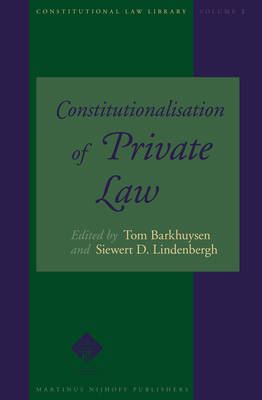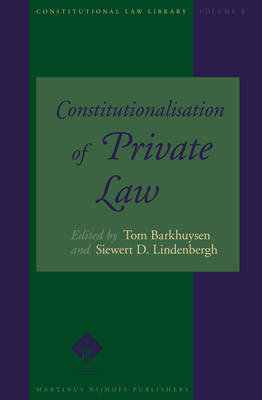
- Afhalen na 1 uur in een winkel met voorraad
- Gratis thuislevering in België vanaf € 30
- Ruim aanbod met 7 miljoen producten
- Afhalen na 1 uur in een winkel met voorraad
- Gratis thuislevering in België vanaf € 30
- Ruim aanbod met 7 miljoen producten
Zoeken
Omschrijving
All over Europe we witness a spectacular rise of the recourse to fundamental rights in debates on civil liability. This is part of a pervasive process of constitutionalisation, of private law in general and tort law in particular.
This publication aims at establishing a clear analysis of the nature and growth of the C-factor (C for constitutionalisation) in Germany, France, the UK and The Netherlands. This analysis will be followed by answering the questions: How are these developments to be judged? Does the C-factor seriously undermine the autonomy of private law ('The purpose of private law is simply to be private law', Ernest J. Weinrib, The Idea of Private Law)? And if so, does it matter? How are we to handle the C-factor? Should we embrace it wholeheartedly, or rather adopt a policy of being neglect or even try to eradicate it altogether?
This publication aims at establishing a clear analysis of the nature and growth of the C-factor (C for constitutionalisation) in Germany, France, the UK and The Netherlands. This analysis will be followed by answering the questions: How are these developments to be judged? Does the C-factor seriously undermine the autonomy of private law ('The purpose of private law is simply to be private law', Ernest J. Weinrib, The Idea of Private Law)? And if so, does it matter? How are we to handle the C-factor? Should we embrace it wholeheartedly, or rather adopt a policy of being neglect or even try to eradicate it altogether?
Specificaties
Betrokkenen
- Auteur(s):
- Uitgeverij:
Inhoud
- Aantal bladzijden:
- 144
- Taal:
- Engels
- Reeks:
- Reeksnummer:
- nr. 2
Eigenschappen
- Productcode (EAN):
- 9789004148529
- Verschijningsdatum:
- 11/08/2006
- Uitvoering:
- Hardcover
- Formaat:
- Genaaid
- Afmetingen:
- 164 mm x 244 mm
- Gewicht:
- 408 g

Alleen bij Standaard Boekhandel
+ 470 punten op je klantenkaart van Standaard Boekhandel
Beoordelingen
We publiceren alleen reviews die voldoen aan de voorwaarden voor reviews. Bekijk onze voorwaarden voor reviews.











